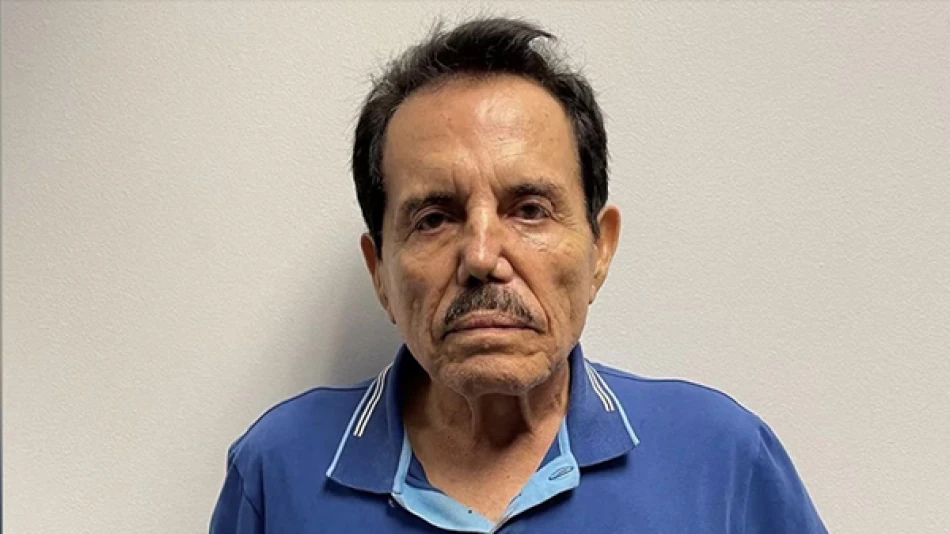
Drug Kingpin Pleads Guilty to Smuggling Narcotics into the US
Sinaloa Cartel's "El Mayo" Zambada Pleads Guilty in Brooklyn Court, Marking End of an Era
Ismael "El Mayo" Zambada, the 77-year-old co-founder of Mexico's Sinaloa Cartel, pleaded guilty to drug trafficking charges in a Brooklyn federal court on Monday, effectively closing the book on one of the most powerful criminal enterprises in modern history. His admission comes after prosecutors agreed to drop the death penalty, signaling a strategic shift in how the U.S. handles aging cartel kingpins.
The Fall of a Drug Empire Architect
Zambada's guilty plea encompasses charges related to racketeering conspiracy and running a continuing criminal enterprise—crimes that fueled decades of violence and pumped massive quantities of cocaine, heroin, and other narcotics into American communities. Under his leadership alongside the now-imprisoned Joaquín "El Chapo" Guzmán, the Sinaloa Cartel evolved from a regional trafficking group into what prosecutors describe as the world's largest drug smuggling organization.
The timing of Zambada's capitulation is significant. Captured in Texas last year after evading authorities for decades, his decision to plead guilty came just two weeks after federal prosecutors announced they would not seek the death penalty—a calculated move that likely influenced his legal strategy.
Strategic Prosecution Reflects Changing Enforcement Priorities
The government's approach to Zambada's case reveals a more pragmatic stance toward aging cartel leaders. Rather than pursuing a lengthy death penalty case that could drag on for years, prosecutors secured a guaranteed conviction against one of Mexico's most elusive criminals. This shift mirrors similar strategies used against other high-profile organized crime figures, where cooperation and intelligence gathering often prove more valuable than maximum punishment.
Intelligence Goldmine for Future Operations
Zambada's cooperation could provide unprecedented insights into cartel operations, financial networks, and corruption schemes that have operated across multiple countries for decades. His knowledge spans relationships with Colombian suppliers, Chinese precursor chemical providers, and corrupt officials throughout Latin America—intelligence that could reshape U.S. counter-narcotics strategy.
Market Impact and Succession Dynamics
The Sinaloa Cartel's leadership vacuum, following both Guzmán's life sentence and now Zambada's capture, has already triggered violent succession battles across Mexico. Unlike previous cartel disruptions that simply elevated lieutenants, this leadership crisis occurs amid increased competition from the Jalisco New Generation Cartel and other rival groups.
For financial markets, Zambada's plea represents both opportunity and risk. While it signals successful law enforcement cooperation between the U.S. and Mexico, the resulting power struggle could destabilize regions crucial to North American trade, particularly along border manufacturing corridors.
Broader Implications for U.S.-Mexico Security Cooperation
This case demonstrates the evolving effectiveness of bilateral law enforcement efforts, particularly compared to the chaotic pursuit of other cartel leaders in the 2000s and 2010s. The relatively quiet nature of Zambada's capture and prosecution suggests improved intelligence sharing and operational coordination between American and Mexican authorities.
However, the Sinaloa Cartel's transformation from a hierarchical organization to a more decentralized network of affiliated groups means that removing top leadership may have diminishing returns. The cartel's business model has proven remarkably resilient, adapting to leadership changes, route disruptions, and law enforcement pressure while maintaining its dominant market position.
Zambada's sentencing, expected in the coming months, will likely result in a life sentence—a symbolic victory for prosecutors but one that comes decades after the damage to American communities was already done. The real test will be whether the intelligence gained from his cooperation can prevent the next generation of traffickers from achieving similar scale and influence.
Most Viewed News

 Layla Al Mansoori
Layla Al Mansoori






